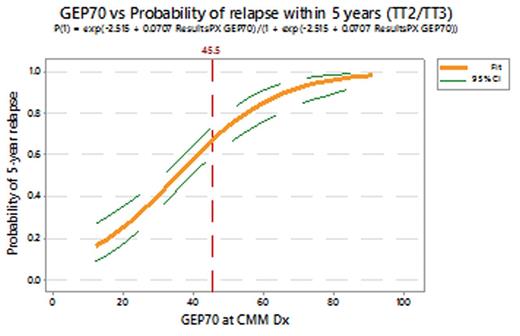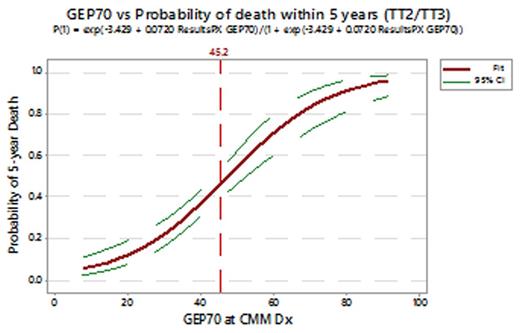Abstract
Background: The 70-gene prognostic risk score (MyPRSR) for patients with multiple myeloma is conventionally used in a binary high/low risk fashion. The ability to more precisely estimate a patients' risk of 5-year relapse or death based on their specific risk score may increase the clinical utility of the assay.
Methods and Results: Logistic regression analysis of the 70-gene score in relation to event free and overall survival data from UAMS TT2/3 series was performed. 274 patients with at least 5 years' follow-up data were included in the analysis. A binary fitted line plot, which fits a model with one continuous predictor with an iterative reweighted least squares algorithm to obtain maximum likelihood estimates of the parameters, was generated for 5-year relapse-free and overall-survival. These plots correspond to the probability of a certain event occurring based on a specific 70-gene score.
The deviance R-square value for the relapse free survival analysis was 12.28% and the odds ratio for the 70-gene score as a continuous predictor was 1.03 (95% CI: 1.02 to 1.05). For overall survival the deviance R-square value was 15.5% and odds ratio 1.07 (95% CI: 1.05 to 1.10).
Conclusion: The 70-gene prognostic risk score is continuously associated with increased risk of 5-year relapse and death. Presentation of a patients' risk score in this format may enable superior risk-based management compared to binary high/low risk stratification. Further work is ongoing to investigate the association between GEP70 and risk of progression from precursor conditions, such as MGUS, to MM requiring treatment.
van Laar:Signal Genetics, Inc.: Employment. Bender:Signal Genetics, Inc.: Employment. Zielinski:Signal Genetics, Inc.: Employment. Leigh:Signal Genetics, Inc.: Employment. Barlogie:Mount Sinai Hospital: Employment. Morgan:Univ of AR for Medical Sciences: Employment; Bristol Meyers: Consultancy, Honoraria; Takeda: Consultancy, Honoraria; Janssen: Research Funding; Celgene: Consultancy, Honoraria, Research Funding.
Author notes
Asterisk with author names denotes non-ASH members.



This feature is available to Subscribers Only
Sign In or Create an Account Close Modal